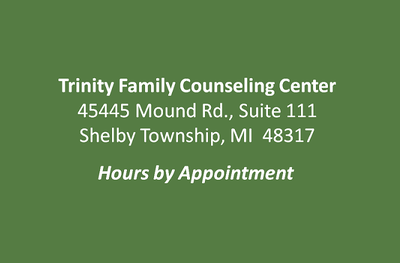Family Counseling
|
Our problems with others rarely exist in isolation. Many times, we come to realize that the interaction within our family unit itself is what is not working well. Maybe there are unresolved misunderstandings from the past? A lack of sufficient boundaries in family relationships? Or cycles of conflict that keep recurring? There are also generational differences and alliances that develop within a family that can result in hurt feelings and long-held resentments.
A competent family counselor can help family members begin to sort out and “own” their piece of responsibility for the family dysfunction. Our counselors at Trinity have experience working with families to assist them in identifying their cycles of dysfunction. We can offer an objective perspective about the overarching patterns of interaction at the center of the problems. While commitment to the process is a necessary feature of successful family counseling, often times simply gathering in the same room—at the same time—to talk about their challenges with an objective third party can in and of itself—be healing. |





